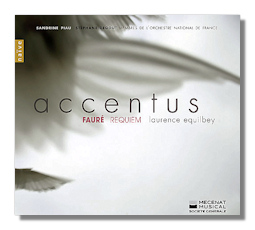
The Internet's Premier Classical Music Source
Related Links
- Fauré Reviews
- Latest Reviews
- More Reviews
-
By Composer
-
Collections
DVD & Blu-ray
Books
Concert Reviews
Articles/Interviews
Software
Audio
Search Amazon
Recommended Links
Site News
 CD Review
CD Review
Gabriel Fauré

- Messe de Requiem, Op. 48
- Cantique de Jean Racine, Op. 11
Sandrine Piau, soprano
Stéphane Degout, baritone
Members of l'Orchestre National de France
Accentus/Laurence Equilbey
Naïve V5137 DDD 41:21
Fauré's Requiem shows no signs of diminishing in popularity. Lacking the terrifying cataclysms of analogous works by Mozart, Berlioz, and Verdi, to name just three, Fauré's Requiem is a "peace out" that leaves one feeling merely wistful and somewhat comforted at the prospect of one's own mortality. If death, like taxes, is inevitable, better that it should come to the accompaniment of tunes such as these.
In spite of the affection so many feel for it – or better, because of it – this work has suffered a history of mild abuse. Until recently, it usually was played and recorded in a version calling for a large orchestra … and, by extension, a choir to match it. This new recording, like several released during the last 15 years, returns to the composer's original thoughts, using a chamber orchestra and a choir consisting of nine sopranos, eight altos, eleven tenors, and nine basses. (Six young singers from the Maîtrise de Paris are added in the "Sanctus.") Fauré's intimate inspiration – it consistently says toi rather than vous – is better served by this 1893 version.
Accentus has made many fine and unusual recordings over the years, and it comes as no surprise that they and their director, Laurence Equilbey, have something relevant to say about the Requiem and its perpetual disc-mate, the Cantique de Jean Racine. The performances are unusually devout, which is not to say that they are dull or starchy, or even lacking in sensual appeal. It is tempting to get caught up in all this angelic beauty and to convert it, probably unintentionally, into velvety kitsch. Equilbey and Accentus don't neglect to give the music some backbone. Heaven may be attained by those who believe, but these performances seem to say that heaven won't simply be dropped in everyone's lap! They are like being lectured by a stern nun who, after her lesson is over, smilingly dispenses bon-bons anyway.
The choir's precision, as well as its tonal blend and balance, are exceptionally good. Sandrine Piau is boyish, but not excessively so, in the "Pie Jesu," and Stéphane Degout sings his two solos with appealing humility, as well as with impeccable style. I don't care for the saccharine solo violin in the "Sanctus," though – it seems out of character with the rest of the performance.
The recording venue was Sainte-Clotilde in Paris; the basilica adds its own very appropriate voice to this recording. My only other complaint is the shortness of the CD, but this is a common problem, where recordings of this work are concerned.
Copyright © 2009, Raymond Tuttle




















